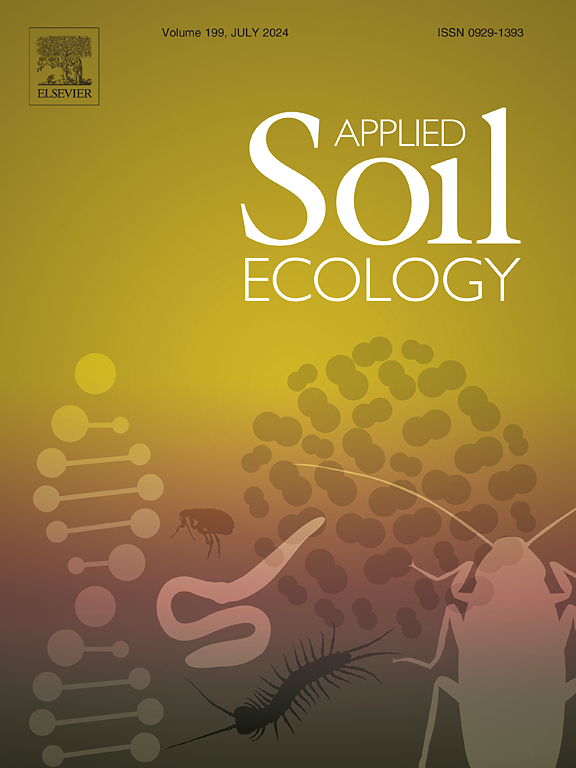即使在缺水条件下,土壤细菌和共生根瘤菌也能在不改变原生根际微生物群的情况下协同促进苜蓿植物的固氮和生物量生产
IF 5
2区 农林科学
Q1 SOIL SCIENCE
引用次数: 0
摘要
在现代和可持续农业中,生物固氮(BNF)的开发利用是替代合成氮肥的一种方法,但会导致地下水污染、土壤质量下降和温室气体排放。本研究旨在探索固氮共生根瘤菌与非共生土壤细菌对低投入苜蓿产量的协同效应。研究了含有固氮苜蓿共生体Sinorhizobium meliloti的两个微生物群落(Mix1和Mix2)以及不同数量的土壤细菌,这些细菌的PGP(植物生长促进)特性(IAA生产、固氮和磷酸盐增溶)导致了协同效应。通过体外培养试验、生长室试验、盆栽试验和田间试验,在日益复杂的条件下对这两个联合体和S. meliloti菌株进行了测试。在实验室生长室中,与单独接种S. meliloti的苜蓿植株相比,接种组合Mix2的苜蓿植株的氮酶活性有所提高,该组合含有更多不同活性的菌株。田间试验表明,即使在缺水条件下,接种了mix2的植株生物量产量和固氮同化(15N试验)也显著高于未接种和接种了mix1的植株(原生微生物群)。此外,没有检测到财团对本地根际微生物群的显著影响。研究结果表明,含有根瘤菌和非根瘤菌的PGP菌群在不改变土壤生态的情况下,可以促进豆科植物的生长和固氮,而且菌群的多样性和协同作用可以作为预测田间试验成功的一个很好的指标。本文章由计算机程序翻译,如有差异,请以英文原文为准。

Soil bacteria and symbiotic rhizobia synergistically promote nitrogen fixation and biomass production of alfalfa (Medicago sativa L.) plants even under water shortage conditions without altering the native rhizospheric microbiota
In modern and sustainable agriculture, the exploitation of biological nitrogen fixation (BNF) is an alternative to synthetic nitrogen fertilizers which can lead to groundwater contamination, reduction of soil quality, and greenhouse gas emissions. This study aimed to exploit the synergistic effects of nitrogen-fixing symbiotic rhizobia and nonsymbiotic soil bacteria on alfalfa (Medicago sativa L) yield in low-input farming. Two microbial consortia (Mix1 and Mix2) containing a nitrogen-fixing alfalfa symbiont Sinorhizobium meliloti were tested along with a different number of soil bacteria whose PGP (Plant Growth Promoting) characteristics (IAA production, nitrogen fixation, and phosphate solubilization) led to synergistic effect. The two consortia and the S. meliloti strain were tested under increasingly complex conditions, through in vitro strain culture testing, growth chamber, pot trials, and field trials. In the laboratory growth chamber, the alfalfa plants inoculated with the consortium Mix2, containing more strains with different activities, showed increased nitrogenase activity compared to those inoculated with S. meliloti alone. Field experiments showed that biomass production and assimilation of nitrogen due to nitrogen fixation (15N test) of Mix2-inoculated plants was significantly increased compared to Mix1-inoculated and uninoculated ones (native microbiota), even under water shortage. Moreover, no significant impact of consortia on the native rhizospheric microbiota was detected. Our findings indicated that consortia containing both rhizobia and non-rhizobia PGP strains, which don't alter soil ecology, could be used for the enhancement of growth and nitrogen fixation of legume plants and that diversity and synergistic interaction of the consortium could be a good index for predicting success in field trials.
求助全文
通过发布文献求助,成功后即可免费获取论文全文。
去求助
来源期刊

Applied Soil Ecology
农林科学-土壤科学
CiteScore
9.70
自引率
4.20%
发文量
363
审稿时长
5.3 months
期刊介绍:
Applied Soil Ecology addresses the role of soil organisms and their interactions in relation to: sustainability and productivity, nutrient cycling and other soil processes, the maintenance of soil functions, the impact of human activities on soil ecosystems and bio(techno)logical control of soil-inhabiting pests, diseases and weeds.
 求助内容:
求助内容: 应助结果提醒方式:
应助结果提醒方式:


